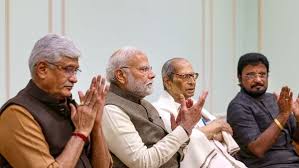Modi Cabinet approves one nation one election
 NEW DELHI : The ‘One Nation, One Election’ Bill has been approved by the Union Cabinet on Thursday (December 12, 2024). It is likely to be introduced in Parliament next week.
NEW DELHI : The ‘One Nation, One Election’ Bill has been approved by the Union Cabinet on Thursday (December 12, 2024). It is likely to be introduced in Parliament next week.
The Cabinet has approved two bills required to implement the ‘One Nation, One Election’ proposal. The bill also proposes plans to hold simultaneous Lok Sabha and assembly elections and later municipal elections. According to a top source, these bills – which talk about amending sections of the Constitution – will likely be introduced in the ongoing winter session of Parliament.
These bills were approved in a meeting chaired by Prime Minister Narendra Modi. The bills approved also include amendments to Article 82, which deals with state-wise allocation of Lok Sabha seats and division of states into territorial constituencies after each national census. The two bills will change the term and dissolution of the Lok Sabha and state assemblies.
The second amendment deals with aligning the tenure of the Lok Sabha and state assemblies, while changes will also be made to provisions of three laws, each of which talks about aligning the assemblies of the three Union Territories – Puducherry, Delhi and Jammu and Kashmir – with the states and the Lok Sabha. A top government official said these proposals do not need to be approved by at least 50 per cent of the states.
However, any move to hold local body elections simultaneously with the Lok Sabha and state assemblies will need to be approved by at least 50 per cent of the states as it deals with matters pertaining to state affairs. Legal experts have warned that failing this, the proposal will run the risk of being accused of violating India’s federal structure. Earlier on Wednesday, Union Agriculture Minister Shivraj Singh Chouhan had strongly advocated ‘one nation, one election’, saying frequent elections were hampering the country’s progress. Addressing a program organized in Kurukshetra under the International Gita Mahotsav, Shivraj Singh Chouhan said that the country is moving forward rapidly under the leadership of Prime Minister Narendra Modi.
Many obstacles in the way of ‘One Nation, One Election’
The central government has been in support of One Nation, One Election from the beginning. However, changing the existing system is a very challenging task. Consensus is very necessary for this. To implement One Nation One Election in the country, about 6 bills will have to be brought to amend the Constitution. All these will need a two-thirds majority to be passed in Parliament.
Bengal Chief Minister Mamata Banerjee criticized the “anti-federal system” exercise and termed it “an authoritarian imposition designed to weaken India’s democracy and federal structure”. She joined her Tamil Nadu counterpart MK Stalin in condemning it, calling it “anti-democracy”. Congress, Uddhav Thackeray’s Shiv Sena and Arvind Kejriwal’s AAP also expressed their views on this.
Kovind panel report
On Wednesday, former President Ram Nath Kovind, who heads the panel set up to make ‘one nation, one election’ a reality – called on the government and states to build a consensus. “This issue is not in the interest of any one party… but in the interest of the nation. It will prove to be a game changer,” he said. He announced that consulting economists had predicted a GDP growth of 1 to 1.5 per cent. In September, the Cabinet had approved the Kovind panel’s report.
The panel – which has Home Minister Amit Shah and Law Minister Arjun Ram Meghwal as members – had said there was a “unanimous opinion that simultaneous elections should be held”. Holding simultaneous elections would “transform the electoral process (and) governance” and “optimise scarce resources”, the panel had said, noting that 32 parties and prominent judicial figures, including former Supreme Court chief justices and high court judges, had supported the measure.
One of the benefits claimed was that it makes the electoral process easier, and that coordination would also boost economic growth; the argument was that a single round of elections would allow businesses and corporate firms to make decisions without fear of adverse policy changes. The government in turn had argued that the ‘One Nation, One Election’ campaign would also “prevent policy paralysis”, and remove the “atmosphere of uncertainty” caused by frequent elections.
The challenges of ‘One Nation, One Election’
Apart from coordinating electoral cycles with minimal disruption (and ensuring that all political parties participate), it also involves finding ways to deal with disruptions caused by dissolution of the Houses, imposition of President’s rule or even instability in the Assembly or Parliament.

